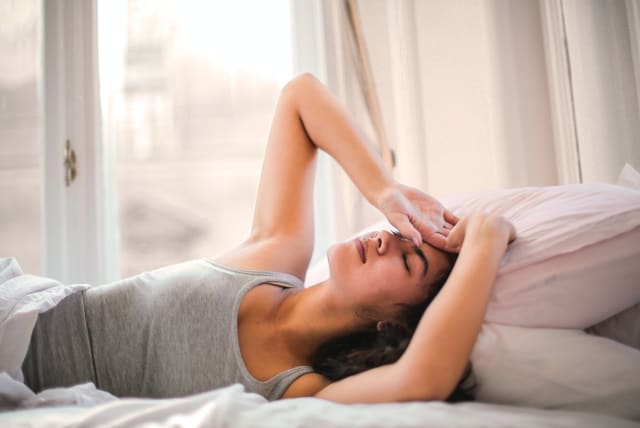Sleep Divorce: Do people really sleep better if they're not sharing a bed?

A new survey shows that sleeping alone may be healthier than sleeping with a partner, lending some support to those couples who practice what has been dubbed "sleep divorce."
It may be healthier to sleep alone than it is to share a bed with a partner, according to an online survey conducted by OneCare Media that covered the phenomenon of "sleep divorce."
This term refers to the practice of couples choosing to sleep in separate rooms or beds, and while it is still somewhat stigmatized, it might be the best way to ensure a good night’s sleep.
The results of OneCare Media’s survey came from 1,250 survey participants in the United States, 625 females and 625 males who were aged 18 and older at the time of the survey. All participants reported that they regularly shared a bed with at least one other person.
Out of the 1,250 adults who took part in the survey, only 1.4% said they started and maintained a sleep divorce in the past year. However, 52.9% of those respondents said that the arrangement has improved their sleep quality. They also reported sleeping an extra 37 minutes each night since sleeping apart.
One respondent, Nikki Gonzales, who works at a start-up, has slept separately from her husband Nathan, a stay-at-home dad, for the past year due to their differing schedules.
“He goes to bed much later than I do,” said Gonzales, according to sleepfoundation.org. “It works really well for us to have our own space.”
While 15% of respondents joined Gonzales in accommodating different sleep schedules as their reason for sleeping apart, nearly 25.8% of survey respondents said that they slept separately from their partner due to relationship issues.
Despite this, Wendy M. Troxel, Ph.D., a senior behavioral scientist at RAND Corp. and a SleepFoundation.org medical advisory board member, said that a sleep divorce can be a tool for a thriving, healthy relationship.
“All these beliefs that we have about sleeping apart preclude us from even considering the possibility that maybe we’d actually sleep better [apart] and it’d be good for our relationship,” Troxel said.
Another respondent, Regina Cross, started sleeping apart from her husband during her pregnancy. They recoupled after their child was born, but ultimately decided to return to sleeping separately.
“We realized that we both sleep better apart, and we have done that for more than nine years now,” she says. “When we sleep, we’re in different rooms, but we also maintain a pretty active intimate life.”
Other factors, such as sleep disorders or allergies, may also be reasons for couples to initiate a sleep divorce. About 30% of adults cited sleep issues as a reason they sleep apart, with 16.5% saying they disrupt their partner’s sleep and 13.5% citing their partner’s sleep issues.
Menelik Tafari and his partner, London King, also started sleeping separately after the birth of their child and continued due to sleep issues that run in the family.
“My mom, my grandma, my father, me, and the baby all have sleep issues,” said Tafari, who added that he and his partner plan to recouple at bedtime in the future.
Can a "sleep divorce" be temporary?
Troxel explained that a sleep divorce does not have to be permanent.
“Often, the way that couples finally start to problem-solve together effectively is to think less about a sleep divorce as being all-or-nothing or forever,” she said.
Emily Wilson and her husband, Chris, have a seasonal sleep divorce, sleeping separately for just six weeks each year.
“My husband started getting really bad allergies so we started [sleeping separately] every spring when he has allergies,” Wilson says. “I’m a light sleeper, so it was definitely affecting me.”
Wilson said that the arrangement improved her sleep, but also shared that she looked forward to recoupling with her husband once his allergies subsided.
”There's tears of internal happiness,” Wilson said.
Re-coupling can also lead to improved sleep. Survey respondents who started sleeping together again reported sleeping 10 to 12 minutes more than when they slept separately, and about 40% of those who have re-coupled said their sleep quality also improved.
Jerusalem Post Store
`; document.getElementById("linkPremium").innerHTML = cont; var divWithLink = document.getElementById("premium-link"); if (divWithLink !== null && divWithLink !== 'undefined') { divWithLink.style.border = "solid 1px #cb0f3e"; divWithLink.style.textAlign = "center"; divWithLink.style.marginBottom = "15px"; divWithLink.style.marginTop = "15px"; divWithLink.style.width = "100%"; divWithLink.style.backgroundColor = "#122952"; divWithLink.style.color = "#ffffff"; divWithLink.style.lineHeight = "1.5"; } } (function (v, i) { });

